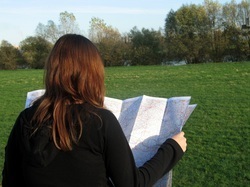Lori Ann Bloomfield's Blog, page 8
August 27, 2013
Equation for Inspiration
 Image courtesy of Keerati/ FreeDigitalPhotos.net
Image courtesy of Keerati/ FreeDigitalPhotos.net When I was first starting out as a writer I used to wait for inspiration to strike before writing. The problem with this was I hardly ever wrote. Even my twenty-year-old self could see that a lifetime of this approach was not going to amount to nearly enough words to call myself a writer. And being a writer was what I was determined to be.
I needed to find a way to write even when I didn’t feel inspired. At first I wondered if this was even possible. Then I worried that my writing would be flat as road kill if I ‘forced’ myself to write. It turned out that I had nothing to worry about. I was about to learn that I could make my own inspiration - and it was surprisingly simple.
Through a combination of old-fashioned trial and error, and reading every book on writing I could get my hands on, I discovered that the ingredients to make inspiration are: a writer, a pen, a notebook and a writing schedule. Each one, it turns out, is essential. (Note: Okay, okay, the pen and notebook could be replaced with a computer, but only if you insist on being modern. I believe writing is a whole body activity and truly believe I write better in longhand.)
The first three are obvious: it is committing to a schedule that surprises many writers. But it has
been my experience if you settle on a schedule, even if it is only fifteen minutes a day, and you show up consistently, the Muse will, too.
You must show up on the page when you say you will, though. You must not stand up the Muse. Show up, even when you don’t feel like it, even when you are sure you have nothing to say and the Muse will meet you there. Then the words will flow and you’ll be making your own inspiration.
The Equation for Inspiration is:
One writer + One pen + One notebook + A Writing Schedule = Inspiration
*Next week’s blog post will be about developing a writing practice so that you can test this for yourself and see if it works for you.
To stay inspired, get weekly blog updates sent to your inbox. It's easy. Just sign up for the newsletter.
Published on August 27, 2013 17:35
August 20, 2013
How Do You Know When a Story is Done?
Published on August 20, 2013 17:38
August 13, 2013
Having Trouble Finishing Writing Projects?
 Writing anything, whether it be a novel, an essay, a short story or a blog post, is a journey. Most of my writing journeys follow a predictable path.
Writing anything, whether it be a novel, an essay, a short story or a blog post, is a journey. Most of my writing journeys follow a predictable path. If I were to draw a map of this path it would look like a giant letter U. I suspect many writers find themselves traveling a similar path. If you are having trouble finishing your writing projects it may be because you reach the bottom of the U (a horrible, unavoidable place) and are not sure how to go on from that point. In which case, a map is helpful.
For me the journey begins at the upper left hand corner of the U with a spark of inspiration.
Whenever I get an idea I’m pretty sure it is the most fabulous, unique, brilliant idea that has ever occurred to anyone since dinosaurs walked the earth. I am click-my-heels-together happy at this stage and cannot wait to start.
When I begin writing my story almost immediately it hits a snag. I am sliding down the side
of the U, but don’t know it yet. The idea that glowed so shiny and perfect and whole in my mind is having trouble traveling down my arm and slipping out my pen. Words that should be flowing like Niagara Falls instead drip onto the page like water leaking from a rusty faucet.
But I persist, drip by drip, word by word until slowly I begin to realize this is not a brilliant idea.
Then the more I write, the more I begin to suspect this may not even be a semi-good idea. What so recently had shimmered in my mind like a finely woven silk tapestry looks on the page like something the cat coughed up.
I keep working until I can see that this story is, in fact, terrible. Then I decide that I have been deluding myself into thinking I have what it takes to be a writer. I tell myself that whatever success I had in the past was clearly luck and now the truth is out. I consider destroying the story but am too tired and depressed to hit the delete button.
This is the bottom of the U. The dark night of the soul. At this point I usually begin surfing the internet and fantasizing about other ways to better spend my time. Clearly I am wasting my life as a writer. I wonder if I am too old to become a race car driver, then remember I don’t even have a driver’s license. To avoid writing I fantasize about getting my licence and one day becoming the first senior citizen to race Formula One.
At this point my writing project and I usually take a break from each other. I’ve found that it is
best if we spend a few days, or even weeks apart. Eventually, after some time has gone by, I get my courage up and reread the story. I might still think it is crap but inevitably I spot a tiny glimmer of something interesting in it.
And this is how I start to climb out of the bottom of the U. I ignore everything else in the story and concentrate only on that small speck of interesting. If I have to, I will scrap the entire draft, except for one small sentence. Then I start rewriting. Invariably the story heads off in a direction that I never planned. New characters walk onto the page. New unexpected things happen. This can be a slightly disconcerting period, but is often exciting, too. It is not the story I first envisioned, but I am writing, so I keep going. Sentence by sentence I am climbing up out of the bottom of the U.
This process keeps repeating itself with lessening intensity as I go through draft after draft. I
just keep writing, focusing on the interesting stuff when I get stuck until eventually the entire piece shines and I cannot think of another way to make it better.
That’s when I know I have arrived at the top of the other side of the U with a finished story.
But the story is never the shiny, perfect one that I first imagined. Still, it is a story and I made it, and I feel pretty proud of myself.
Then a bit of time passes and I get a great new idea and the whole process starts again exactly as before, from me thinking I am brilliant, to me thinking I am crap, to me ignoring all those crazy voices and just putting my head down and writing until the story is finished.
And that’s how writing is for me. It’s a bit like being an explorer. And like all explorers I
emerge from the journey tattered and worn, exhausted, but triumphant. I am home again.
Not necessarily with what I expected, but with a story to tell.
Published on August 13, 2013 17:57
August 6, 2013
Myths About Talent
 Image courtesy of Pat138241/ FreeDigitalPhotos.net
Image courtesy of Pat138241/ FreeDigitalPhotos.net I want to tell you a few things about talent. I want you to know these things so that you can forget them and get on with your work as a writer. The myths of talent are like hidden rocks, waiting for sailors to crash into. I do not want you to spend your writing life drowning.
First, I want you to know that having talent does not make writing easy. Too many writers give up too soon believing they must not have any talent because writing feels so hard. Nothing makes writing easy. Not talent. Not anything. This is because writing is hard work. Sorry, but there is no way around this truth. Writing is hard in the same way that climbing mountains is hard. It does not matter how many mountains you summit, the climbing does not get any easier.
The second thing I want you to understand about talent is: there’s a lot of it. It is everywhere. Talent is thick on the ground. Some people’s guts grip when they learn this. They think, “I should give up. There are too many writers who are better than me.” But this truth need not cause you any worry. Writing is not a sport. You are not competing with anyone. No one else can write the stories that are inside of you. No one else can bring your characters to life. Remember this.
Lastly: there is no correlation between talent and success. There is, however, a correlation between success and persistence. This is good news for the writer who keeps writing. Who does not drown, who climbs mountain after mountain while writing the stories they most deeply
believe in. Be this writer.
In the end, the most important question to ask yourself as a writer is not: do I have talent?
But, what will I write today?
Published on August 06, 2013 18:18

 After my last
After my last 

